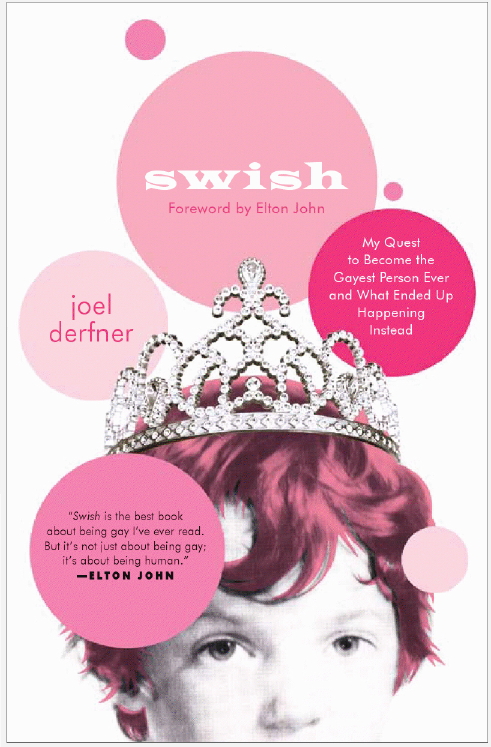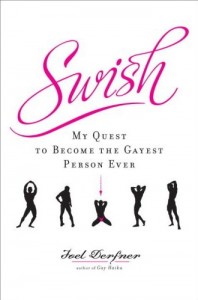
Hello again, campers –
This has been a star-studded month here at Author! Author!, hasn’t it, cram-packed with visits from illustrious literati? First, we heard from an exciting array of guest bloggers on the subject of censorship, up to and including my review of a new book on the subject by a bunch of Nobel Prize winners and short-listers. Earlier this week, award-winning mystery novelist Stan Trollip dropped by to give us a behind-the-scenes peek at how multi-book contracts work.
As if all that weren’t enough to fill our collective cup of joy to overflowing, memoirist Joel Derfner has arrived today to illuminate the opaque process by which book covers spring to life. Then, this weekend, you’re all going to send in your entries to the first periodic Author! Author! Awards for Expressive Excellence.
While I suppose I might take the cynical view that all of this is delightful because people other than me are doing most of the writing on the blog this week — not an inconsiderable boon, given that I’m still on retreat in France — I genuinely do enjoy alerting all of you when an author who deserves to make it big has a book coming out.
In case I’m being too subtle here: today’s guest blogger deserves to make it big.
In fact, speaking as a memoirist myself (and no matter what Amazon keeps telling people, my memoir is not in fact out of print — my publisher still has not released it, due to lawsuit threats), Joel’s current book, SWISH: My Quest to Become the Gayest Person Ever and What Happened Instead, represents some of the best memoir writing of the last decade.
For those of you not up on recent autobiography, the last decade has been a pretty great time for memoir.
So it was not by accident that Joel ended up as the last star to glitter in this month’s Milky Way, as it were. I’m really delighted to bring him to you today.
Am I still being too subtle? This is an author I genuinely admire, and one whose work I would very much like to see more widely known. Call me zany, but I think the book world could use more brilliance in these dark times.
All of you blog aficionados out there may already know Joel’s writing through his hilariously pointed blog, the Search for Love in Manhattan. Here at Author! Author!, he is better known as frequent commenter Faustus, MD. He’s also been generous enough to guest blog in the past on common mistakes writers make in contest entries — which might be worth a gander while you’re prepping for the first periodic Author! Author! Awards for Expressive Excellence, since you’re going to enter, right? — and how authors obtain permission to use song lyrics in their books.
In answer to what lyric-lovers across the globe just thought: yes, you have to, even if you’ve used only a line, if the song is not yet in the public domain — and yes, in the United States, it’s typically the author’s responsibility to obtain permission for reprinted lyrics, not the publisher’s.
Hey, don’t take my word for it — ask Joel.
SWISH has had an honestly jaw-dropping publishing history — but wait, I’m getting ahead of myself. Here’s the publisher’s blurb; see if you can pick up the faint subtext in this marketing excerpt about whom they expect to be the primary audience for this book:
Joel Derfner is gayer than you.
Don’t feel too bad about it, though, because he has made being gayer than you his life’s work. At summer day camp, when he was six, Derfner tried to sign up for needlepoint and flower arranging, but the camp counselors wouldn’t let him, because, they said, those activities were for girls only. Derfner, just to be contrary, embarked that very day on a solemn and sacred quest: to become the gayest person ever. Along the way he has become a fierce knitter, an even fiercer musical theater composer, and so totally the fiercest step aerobics instructor (just ask him—he’ll tell you himself).
In Swish, Derfner takes his readers on a flamboyant adventure along the glitter-strewn road from fabulous to divine. Whether he’s confronting the demons of his past at a GLBT summer camp, using the Internet to “meet” “men” many, many men—or plunging headfirst (and nearly naked) into the shady world of go-go dancing, he reveals himself with every gayer-than-thou flourish to be not just a stylish explorer but also a fearless one. So fearless, in fact, that when he sneaks into a conference for people who want to cure themselves of their homosexuality, he turns the experience into one of the most fascinating, deeply moving chapters of the book. Derfner, like King Arthur, Christopher Columbus, and Indiana Jones—but with a better haircut and a much deeper commitment to fad diets—is a hero destined for legend.
Written with wicked humor and keen insight, Swish is at once a hilarious look at contemporary ideas about gay culture and a poignant exploration of identity that will speak to all readers—gay, straight, and in between.
Anyone manage to crack the code here? Would it help if I called your attention to a name that appears twice on the cover above to Joel’s once?
If you immediately exclaimed, “By gum, I strongly suspect that the target audience here is gay men and the people who like them,” give yourself a great big gold star for the day. Reading marketing blurbs is a magnificent exercise for an aspiring writer, as a means of learning how the publishing world thinks: for them, there is no such thing as a publishable book without a target readership.
Which is why, in case you’ve been wondering, blurbs seldom leave much doubt about the type of reader they’re trying to reach. This lack of ambiguity tends to be reflected in reviews as well — or at least in how they’re placed. Take a gander at some of the reviews of Joel’s memoir:
“In a culture where we disguise vulnerability with physical perfection and material success, Derfner skewers heartache with Wildean wit . . . [Derfner is] the next Noël Coward.” —Out.com
“Searing.” —Washington Blade
“Derfner’s writing is perfect. . . . He’s your best friend. He’s your brother. He is you.” — EDGE Los Angeles
“Sometimes hilarious, sometimes poignant, always clever, and unpredictable.” —Philadelphia Gay News
Again, seeing a pattern here? When SWISH first came out — it’s about to be re-released, for reasons that Joel will tell you all about below as soon as I stop yammering about book promotion and let him get on with it — the marketing focus was even tighter.
So if you responded by the pop quiz above by murmuring, “Hmm, it seems as though the target market here is people just like Joel,” you’re not far off; memoirs are very, very frequently marketed to the author’s own demographic — or demographics, as is often the case.
And while it’s not really fair to summarize SWISH’s first marketing campaign as aimed at humorous gay men with linguistics degrees from Harvard and graduate degrees in musical theatre, I do feel compelled to point out that even though I LOVED this book when it came out last year (if I hadn’t yet made that clear), I might not even have heard about it, because I did not fall into any of the targeted audiences.
Which is a little weird, frankly, as Joel and I have quite a bit in common, including an alma mater.
I’m bringing this up for a couple of reasons. First, first-time authors are frequently stunned at how specific book marketing tends to be, as well as how little say they have over it; while the writer is generally asked for input, the publisher’s marketing department makes the actual decisions about book promotion.
And about the cover, generally, and about the title. Give that some thought the next time you’re browsing in a bookstore.
Second, and more relevant to this particular author, having read SWISH, I feel very strongly that I was — and am — very much part of this memoir’s ideal readership, despite being straight, female, and some undefined number of years older than Joel. I think this book would speak to any woman, any person really, who has struggled with the paradox of attraction and desirability, or with the tension between wanting people to think you’re beautiful and wanting them to think you’re smart.
Which is to say: I think a huge part of this book’s audience is going to be intelligent women who love good writing — who, incidentally, tend to be major-league book-buyers.
So I’m going to be honest here: I was one of the naysayers Joel mentions below. Not only did I feel when the book came out that the original cover, while a lot of fun, was not an accurate representation of the book within; I felt very strongly that SWISH was being marketed to far too narrow an audience, pigeonholed because of its subject matter.
Yes, this memoir deals in what is euphemistically called gay subject matter, but at base, it’s a beautifully written, insightful memoir about working through a whole array of very human insecurities — about whether one is attractive enough, smart enough, lovable enough.
These are universal worries, and Joel’s memoir handles them in an unusually subtle manner. There are insights in this book that I’ve never even seen touched upon in print before — and believe me, people, I read a lot of books and manuscripts in any given year.
In short, it’s a great read, and I was pretty miffed that it wasn’t being marketed that way. SWISH should have been read by a broader range of people when it came out last year; it should have been nominated for awards.
Not being noted for reticence on such subjects, I believe I said so. About 500 times. As both Gore Vidal and I have been pointing out for quite some time now, there is no human problem that could not be solved if only everyone would do exactly as I advise.
Imagine my delighted surprise, then, to learn that a new, improved, updated and retitled SWISH is coming out in June. I’ll let Joel tell you all about it. However, in an industry that’s not exactly notorious for second chances, I think this re-release is something worth celebrating.
As is, however belatedly, the chance to dance in the streets, shouting, “I told you so!”
So please join me in congratulating a great author whose writing is getting the second chance it so richly deserves, Joel Derfner. Take it away, Joel!

When Broadway Books sent me the cover for my memoir, Swish: My Quest to Become the Gayest Person Ever, I was thrilled, because it was hysterically funny:

The ridiculous, over-the-top Spencerian quality of the script, the silhouettes of the posing bodybuilders, the pink thong — they were a perfect foil to the book itself, which started with ideas as shallow and stereotypical as these images and moved from there to (if I do say so myself) depth, insight, and humanity. So we both thought the cover was perfect. We suspected there might be some difficulty in navigating the marketing divide between humor and depth, but we figured that if we erred toward the side of humor we’d be okay, because, as I said to my editor, funny is always better.
So the book was released, perfect cover and all, and I was delighted, and then reviews started coming in, and I was even more delighted, because for the most part they were very good. But then I started to notice something, which was that almost every one said something along the lines of, “From the cover I thought this was going to be silly and annoying, but then I read it and I loved it.” Then people who had read the book started e-mailing me, and almost every one said something along the lines of, “From the cover I thought this was going to be silly and annoying, but then I read it and I loved it.”
And we started getting worried. If so many people who read the book had seen the cover and thought it was going to be silly and annoying, how many people saw the cover, thought the same thing—and didn’t pick up the book?
The answer, unfortunately, turned out to be “a lot.” The problem was that there’s a subgenre of gay literature that appears similar to my book on the outside—flashy, clever, shallow—and that is also flashy, clever, shallow on the inside (Behind Every Woman There’s a Fabulous Gay Man, for example, or How to Get Laid: The Gay Man’s Essential Guide to Hot Sex). Since I knew myself, and since my editor knew me, we got a kick out of the disjunct between the cotton-candy outside of my book and the rich center. Unfortunately, we forgot that the book-buying public did not know me. Seeing the unsubstantial outside, therefore, they assumed that book had an unsubstantial inside as well. It was awful.
The following things gradually became clear:
- Straight people thought the book would be interesting only to gay people, so they didn’t buy it.
- Gay people who liked good writing though the book would be interesting only to people who liked fluff, so they didn’t buy it.
- Gay people who liked fluff bought the book and then, quite often, got angry when it wasn’t fluffy. (Seriously. A couple reviews were like, what is this? Where’s the Cher? There are hunky guys on the cover, why is he telling us about his dead mother?)
(There’s also of course the possibility that the reason people didn’t buy the book is that it was bad. But in that case this post would be completely unhelpful, so let’s assume for the sake of discussion that this wasn’t so.)
During this time I also sent a few pieces around to magazines and newspapers, none of which expressed any interest. Again, it could be that what I sent was bad, or that it simply wasn’t what the people I sent it to were looking for, but I have to believe that when they saw the title of my book in a cover letter or e-mail it didn’t do me any favors.
My agent took me to lunch and told me that Broadway was planning to sell the paperback rights, which is very bad; it usually means that the publisher has given up on a book and wants to get out while they can still make some sort of profit. “This failure isn’t your fault,” she said.
“Failure?” I said, and wanted to die.
Then I got a phone call from Elton John.
He had read the book and loved it, he said; he also offered to blurb it or write a foreword or help in any way he could.
After I regained the power of speech—which, as you can imagine, took some time—I called my agent and told her, and after she regained the power of speech she called Broadway and told them, and somehow it didn’t seem quite as urgent that they sell the paperback rights.
After a long and undoubtedly agonizing negotiation (none of which I had anything to do with, thank God), Broadway decided that not only would they issue the paperback themselves, but they wanted to repackage the book entirely, with a new cover and a new subtitle. It took literally months to come up with them, but my editor’s assistant told me that I should see this as a good sign, because they wouldn’t spend so much energy on something they didn’t really believe in. (Then my editor got laid off, but her assistant stayed, so I felt I could still trust her advice.)
So the paperback is being released in a couple weeks. It’s called Swish: My Quest to Become the Gayest Person Ever and What Ended Up Happening Instead, it has a beautiful cover that matches the material inside, and it’s graced with a foreword by Elton John. Of course I hope it will become a smash hit, but mostly I’m just grateful that the book has gotten a second chance.
And I’ve learned a valuable lesson for next time, which is that if I’m not careful, my work won’t reach my intended audience because they just won’t pick it up in the first place. Or, more simply put, that people do judge a book by its cover.



 Swish: My Quest to Become the Gayest Person Ever and Gay Haiku author Joel Derfner is from South Carolina, where his great-grandmother had an affair with George Gershwin. After fleeing the south as soon as he possibly could, he got a B.A. in linguistics from Harvard. A year after he graduated, his thesis on the Abkhaz language was shown to be completely wrong, as the word he had been translating as “who” turned out to be not a noun but a verb. Realizing that linguistics was not his métier, he moved to New York to get an M.F.A. in musical theater writing from the Tisch School of the Arts.
Swish: My Quest to Become the Gayest Person Ever and Gay Haiku author Joel Derfner is from South Carolina, where his great-grandmother had an affair with George Gershwin. After fleeing the south as soon as he possibly could, he got a B.A. in linguistics from Harvard. A year after he graduated, his thesis on the Abkhaz language was shown to be completely wrong, as the word he had been translating as “who” turned out to be not a noun but a verb. Realizing that linguistics was not his métier, he moved to New York to get an M.F.A. in musical theater writing from the Tisch School of the Arts.
Musicals for which he has written the scores have been produced in London, New York, and various cities in between (going counterclockwise). In an attempt to become the gayest person ever, he joined Cheer New York, New York’s gay and lesbian cheerleading squad, but eventually he had to leave because he was too depressed. In desperation, he started knitting and teaching aerobics, though not at the same time. He hopes to come to a bad end.
Personally, I think the new subtitle, “… and what ended up happening instead” is the thing that would change my mind about picking up the book, in the absence of other information.
I happen to like the first cover better, but then again I read this blog and knew about the book’s “rich center.” The new second half of the tagline tells EVERYONE there is a rich center. And that’s awesome. Congrats!